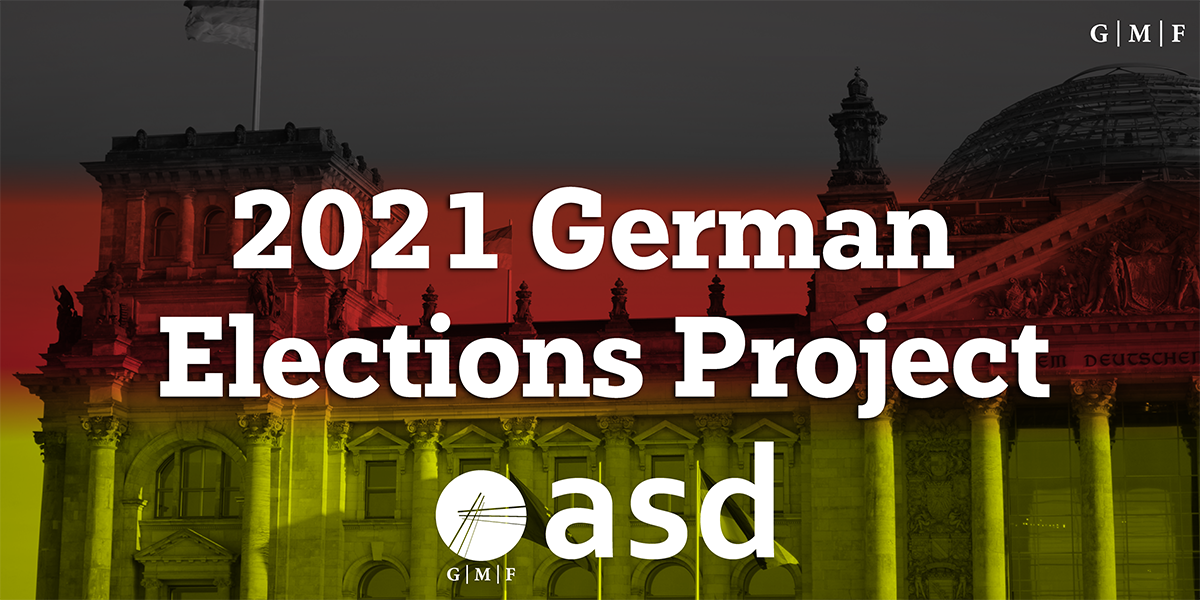Germany’s federal election in September this year will mark a critical change not only for Germany but for Europe as a whole. Chancellor Angela Merkel has led Europe’s largest country and economic powerhouse since 2005, long before the specter of the financial, migration, and coronavirus crises, and she will retire after this election. With the race for chancellor open, the future direction of Germany is up in the air. Not only is this election important for the German people, but it can be an alluring target for foreign and domestic actors seeking to influence elections or undermine democratic processes. Germany, like most democracies, is facing increasingly complex and quickly-evolving threats in the information and technology realms.
In response to the threats facing Germany’s elections, the Alliance for Securing Democracy (ASD) and the German Marshall Fund of the United States (GMF) have launched the 2021 German Elections Project, an initiative that seeks to build resilience to autocratic efforts to interfere in Germany’s democracy by identifying and analyzing information manipulation targeting the upcoming elections.In the framework of this project, we will be identifying and analyzing information manipulation targeting Germany’s elections, providing open-source digital tools and assessments of Germany’s information ecosystem and election infrastructure, and building awareness of foreign efforts to interfere in the elections as well as domestic challenges to democratic processes. We will develop and enhance partnerships with researchers, civil society organizations, and other key stakeholders based in Germany in order to provide greater depth and context to the data ASD collects. This project is supported by the Open Society Foundation and will last until end of the year 2021.
As part of this project, ASD, in collaboration with the Institute for Strategic Dialogue, has created a real-time, open-source dashboard to track foreign and domestic narratives targeting German audiences based on our Hamilton 2.0 Dashboard. The new Germany-focused dashboard will allow researchers, journalists, and government officials to track and compare narratives from key foreign diplomatic accounts and state-funded media outlets. As in the regular Hamilton Dashboard, users will be able to track Russian, Chinese, and Iranian official diplomatic accounts and state-funded media outlets, as well as other actors, to see how these sources seek to shape German and international discussions around election-relevant themes. Additional features available on the German Elections Dashboard include access to the official accounts of Germany’s major political parties, their respective candidates, mainstream media accounts, and the official accounts of other foreign actors, including Turkey. This will allow users to compare a wide range of foreign narratives with domestic discussions.
ASD’s analysis of the U.S. 2020 election and other European elections over the past year has found that foreign actors have exploited certain global topics to enflame tensions during the election cycle. As the current pandemic exacerbates the challenges democratic systems already face, ASD will be looking particularly closely at Russia and China’s information manipulation efforts around Covid-19, vaccinations, and restrictions during Germany’ election period. We will also provide analysis on how Russian and Chinese sources portray the EU-China relationship and economic partnership, the security situation in Ukraine, Russia’s domestic affairs, and each countries’ foreign policy. This project will contribute to a more holistic understanding of the broad range of autocratic threats facing democratic elections and institutions, and how information manipulation campaigns contribute to these efforts, as well provide recommendations democracies can enact to counter authoritarian efforts based on selected good practices from other countries.
The views expressed in GMF publications and commentary are the views of the author alone.






